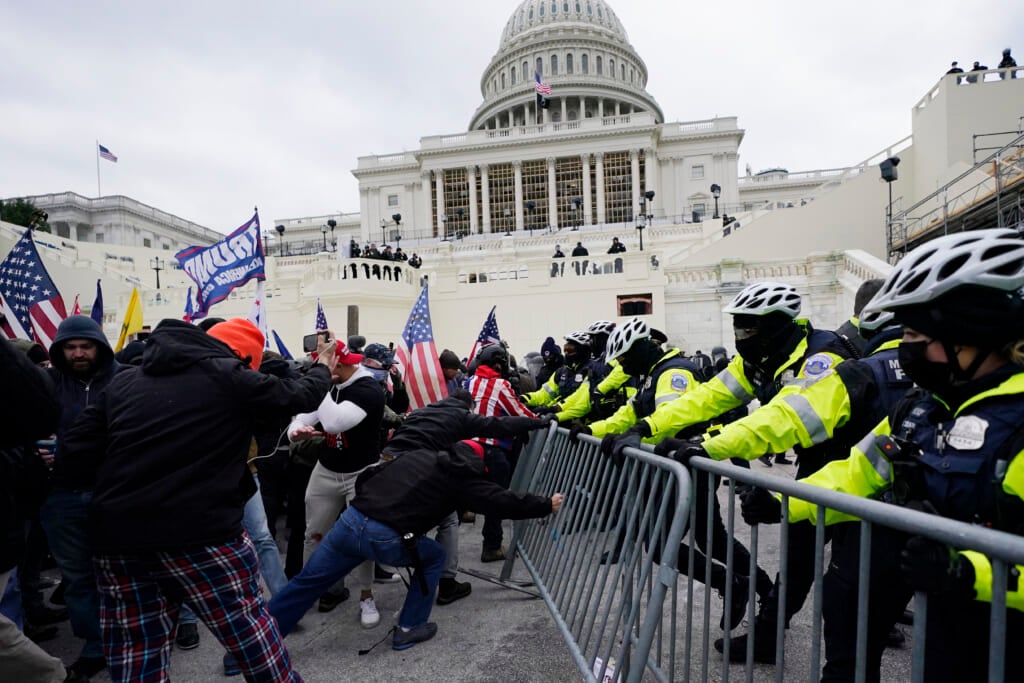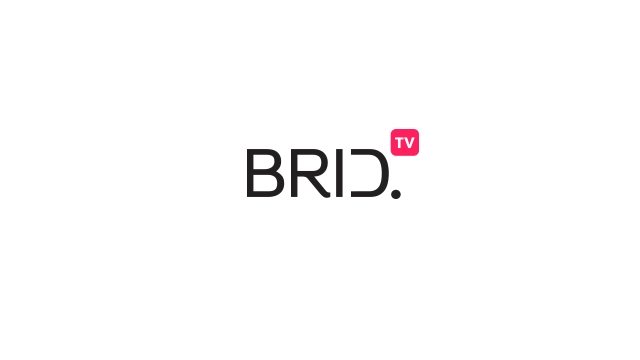On the morning of Jan. 6, 2021, Anthony Williams was working from his midwest home at his laptop when hell broke loose on the steps of the U.S. Capitol.
Williams, 49, watched in horror, eyes glued to the television as Trump supporters broke down the doors of the revered building, violently attacking Capitol police officers and sending politicians of all stripes running for their lives.
“It felt like we were being invaded, which was similar to the feeling I had on 9/11 that we were attacked,” Williams told theGrio in a recent interview.

Williams, who works as a legal assistant, says the sight of the insurrection stirred emotions of anger and hurt.
“Hurt that our fellow Americans were doing this, that we were acting like this was…1932 Germany or something. It just was surreal,” said Williams.
Now, a year and a half after that fateful day, Williams is among many Black American voters surveyed, who want to see former President Donald Trump held accountable for the chaos and bloodshed.
A new theGrio/KFF Survey of Black Voters finds that the majority of Black voters want to see Trump charged with crimes in relation to the Jan. 6 attack on the U.S. Capitol.
The survey asked voters whether they supported Trump being charged for the Jan. 6 insurrection based on what they heard or saw during Congressional hearings conducted by the House select committee investigating the attack, with 84% saying Trump should be charged, and 15% saying he should not.
Based on what you have seen or heard about the January 6th Congressional committee hearings, do you think former President Trump should be charged with crimes?
“I think that principle of no one is above the law should be applied. And I think what we’re seeing in the Jan. 6 hearings, he broke the law,” said Williams.
The findings come at a time when the January 6th Congressional committee has held its ninth and final hearing since June, voting to subpoena Trump and making the case that he knew he lost the 2020 presidential election and intentionally rallied supporters to march on the U.S. capitol, standing by as the violence unfolded.
Thus far, at least 919 people have been charged in relation to the Jan. 6 insurrection, with an estimated 2,000 people breaching the U.S. capitol.
“If that is true, if he participated and that is proven that he participated, then I do think that he should be charged,” said Fatimah Jones, a 30-year-old program manager from New York who also participated in theGrio/KFF survey.
“He is a leader for a lot of people, he influences a lot of people,” Jones, a self-described liberal Democrat, told theGrio. “They were penalized for it. So I felt like as a leader, you should be the first one to go.”
Poy Winichakul, a senior staff attorney for voting rights at SPLC (Southern Poverty Law Center) who focuses predominantly on Georgia, said she isn’t surprised Black voters want justice.
“I think voters are expecting ‘We turned out, we voted, we overcame insurmountable hurdles and we’re just looking for some accountability,” Winichakul told theGrio. “[They say] ‘We want responsiveness from our government at every single level. We’ve done our part. It’s your turn to do your job.’”
Black voters and the general public aren’t polling the same
But the belief that Trump should be charged for Jan. 6 is not shared by the majority of Americans.
A recent poll from Monmouth University says only 41% of Americans favor charging Trump with crimes related to the insurrection – less than half of the country. More than one-third of Americans oppose charging Trump. Even after numerous Jan. 6 Congressional committee hearings, an August Monmouth poll showed Trump maintained about the same favorability rating as before.
The divide is predictably strong along partisan lines, with the majority of Republicans (6 out of 10) still believing President Joe Biden lost the 2020 election.
So what explains the difference between the majority of Black voters and everyone else?
The answer may lie in the perceived double standard on display on Jan. 6.
For Leonard McCray, 66, a Black conservative Republican from South Carolina, the symbolic double standard of violence tolerated on Jan. 6, is enough to make him want Trump charged.
“If a Black person did the same thing that he did, they would be put away in a mental institution,” McCray told theGrio.
McCray, who had a career in advertising and prides himself on being open-minded, said he was outside raking the yard the afternoon of Jan. 6 when the Capitol was breached.
“I came in and the whole country was going crazy, television station to station,” remembered McCray. “The horror that you saw, police officers trampled over, the vandalism of the Capitol building. [Trump] you had your part in all of that. And he just got off scot-free in contrast to a Black person…if Obama did the same thing. And it just hurts because you say – this is democracy in jeopardy.”
Anthony Williams agrees that the race of rioters made all the difference that day.
“Those people were not shot right on sight – that stood out for me,” he said. “As a Black American, we get pulled over for a traffic stop and then it turns deadly in seconds.”
The Survey of Black Voters found that like both, McCray and Williams, the majority of Black voters (84%) believed white supremacy played a major role in the Jan. 6 insurrection.
How much of a role do you think white supremacy played in the events that took place at the United States Capitol on January 6th, 2021?
“The greater extremist movement is an ideology movement,” said Rachel Carroll Rivas, interim deputy director of research for the SPLC’s Intelligence Project, who studies the hard right. “It is an identity movement. It is predominantly a white movement, focused on the benefit and gaining the benefit or retaining the benefit of white people.”
Rivas believes that Trump’s position as a former president has created more resistance to seeing him criminally charged, even outside of white supremacist group circles, which isn’t by coincidence.
“I think that when we think about Donald Trump, it’s ‘he’s more ingrained,’ right? More mainstream, inside the system, that makes people more comfortable to then hold someone like that accountable,” Rivas told theGrio.
“It’s a particular strategy of the hard right to get inside…To get people elected to engage in the judicial system, to go inside politics, to create media, alternative media, to do the sort of inside mainstream piece, because then that discomfort comes and people are more willing to sort of let things sit…What we’re seeing today is the absolute unfortunate success of that strategy from the Tea Party revolution to now.”
What are the consequences of charging Trump?
Even with adequate evidence prosecuting Donald Trump may be more complicated than it appears.
“Jan. 6 was one of the most palpable, visible and clear challenges to organized government that we’ve seen in the past few generations,” said Professor Jenn Jackson of Syracuse University’s Maxwell School of Citizenship and Public Affairs in an interview with theGrio. “It was orchestrated by and very much facilitated by the Trump administration officials and the surrounding chatteri.”
Professor Jackson said to understand the intensity of the continuing threat, we should look to history, namely post-Reconstruction, when after emancipation, thriving Black Americans who built new lives, were attacked by pro-slavery whites.
“What we’re witnessing right now is that shift,” said Professor Jackson, noting a backlash to liberalism. “When that happens, unfortunately, we see this deeply ideological and, I would argue, very violent move. That is the primary reason we haven’t seen Donald Trump carried away in handcuffs, because can you imagine, if they did that on Jan. 6? Imagine what they would do if they saw their leader off in handcuffs.”
Professor Jackson also points to the legal complexity of charging Trump as a former president as a reason for the divided opinion.
“It’s complicated for us because litigating with regards to a past president is really a heavy lift,” said Jackson. “It sets a precedent that can sometimes backfire for future administrations.”
But for Black voters like Williams and Jones, heading into a heated midterm election with America still divided, principle takes priority over backlash.
“It would just send the wrong message if he is not charged,” said Williams.
“We already have a large fraction of one party that doesn’t believe in elections. What happens if they become two parties? What’s left? A civil war? And that’s where I feel we’re headed with all of this.”
For Jones, the past informs her present outlook.
“I’m thinking of America, and I think of Martin Luther King. No one cared about the possibility of how Black folks would feel and the violence and all of that. Like he was killed,” she said.
“So I feel like, no, we’ll figure it out when that happens. Let him be charged.”
Editor’s Note: The real last names of some interviewees were changed in this story.
About the Survey
The Survey of Black Voters is the first partnership survey between theGrio and KFF, a nonprofit organization focused on research and analysis of health and other national issues. Teams from KFF and theGrio worked together to develop the questionnaire and analyze the data, and both organizations contributed financing for the survey. Each organization is solely responsible for its content.
The survey was conducted Aug. 24–Sept. 5 with a nationally representative, probability-based sample of 1,000 adults who identify as Black or African American and are registered to vote. The sample includes all voters who identify as Black or African American, including those who also identify as Hispanic or multi-racial. The sampling design includes Black registered voters reached online through the SSRS Opinion Panel and the Ipsos KnowledgePanel; to reach Black voters who do not use the internet, additional interviews were conducted by calling back respondents who previously participated in an SSRS Omnibus poll and identified as Black and said they did not use the internet. The combined telephone and panel samples were weighted to match the sample’s demographics to the national U.S. population of Black voters using data from the Census Bureau’s 2020 Current Population Survey (CPS) Voting and Registration supplement. Sampling, data collection, weighting and tabulation were managed by SSRS of Glen Mills, Pennsylvania in close collaboration with KFF researchers.
The results have a margin of sampling error of plus or minus 4 percentage points for results based on the full sample of Black voters. The full methodology and question-wording are available here.
Natasha S. Alford is VP of Digital Content and a Senior Correspondent at theGrio. An award-winning journalist, filmmaker, and TV personality, Alford is writing her forthcoming book “American Negra.” Follow her on Twitter and Instagram at @natashasalford.
TheGrio is FREE on your TV via Apple TV, Amazon Fire, Roku, and Android TV. Please download theGrio mobile apps today!

